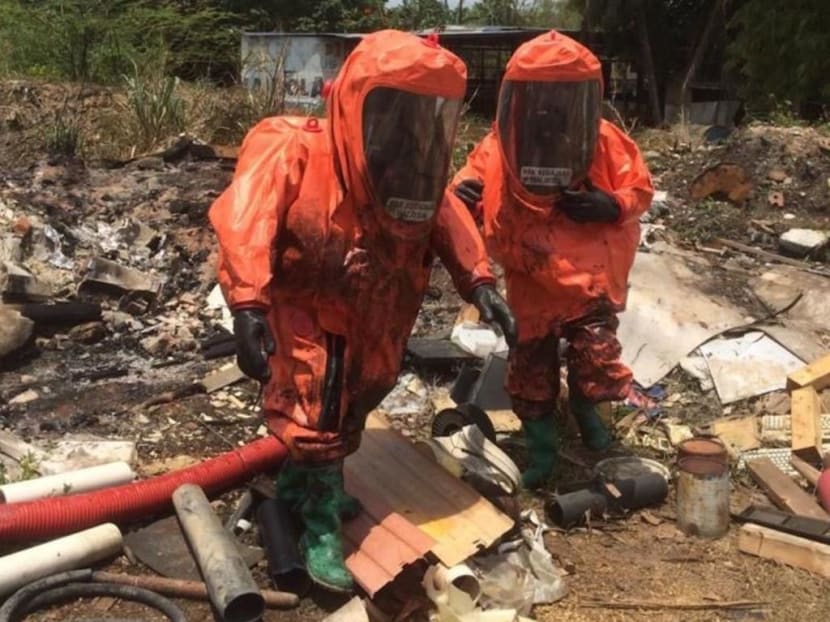PM Lee raises concerns over pollution and long-term yield of Johor water
PUTRAJAYA — Raising Singapore’s concerns over pollution and long-term yield of water from Johor, Prime Minister Lee Hsien Loong said it would be “disastrous” if the Johor River is hit by an incident on the scale of the chemical waste spill at Sungai Kim Kim in Pasir Gudang.

Personnel from the Johor Fire and Rescue Department’s Hazmat unit taking water samples along the Kim Kim River in Pasir Gudang, Johor.
PUTRAJAYA — Raising Singapore’s concerns over pollution and long-term yield of water from Johor, Prime Minister Lee Hsien Loong said it would be “disastrous” if the Johor River is hit by an incident on the scale of the chemical waste spill at Sungai Kim Kim in Pasir Gudang.
He was speaking on Tuesday (April 9) at a press conference to wrap up a retreat with his Malaysian counterpart, Dr Mahathir Mohamad, where he raised these concerns among other things.
Last week, the waterworks of PUB — Singapore’s national water agency — in Kota Tinggi, Johor had to be shut because of high ammonia levels, Mr Lee noted.
The pollution was traced to a burst reservoir at a bio-composite centre next to an oil-palm mill in Sedenak, Johor.
This caused ammonia-tainted water to flow into Sungai Sayong, one of the creeks supplying raw water to the Johor River.
The incident did not affect Singapore’s water supply but disrupted water supply to about 17,000 households in Kulai, Johor.
This followed the discovery of illegal dumping of toxic waste at Sungai Kim Kim in Pasir Gudang, Johor last month, which resulted in toxic fumes that have affected thousands of residents and led to about 100 schools in the area being shut down.
“If the Johor River suffers an incident like that (at) Sungai Kim Kim recently, I think it will be disastrous for both countries,” Mr Lee said.
Mr Lee said Singapore was also concerned about the long-term yield of the Johor River.
Johor has built water plants along the Johor River, upstream from PUB’s waterworks at Kota Tinggi.
“These plants combined, plus the Kota Tinggi waterworks belonging to PUB, draw from the Johor River quite possibly more water than the river can sustain,” Mr Lee said.
1962 WATER AGREEMENT “SACROSANCT”
Amid a dispute over water prices revisited by Malaysian Prime Minister Mahathir Mohamad, Mr Lee said there was a need to study ways in which Johor and Singapore can meet their water needs for the remainder of the 1962 Water Agreement.
Under the agreement, Singapore can buy 250 million gallons of water a day from the Johor River, at 3 sen for every 1,000 gallons.
In return, Johor has the right to buy back a daily supply of treated water from Singapore, of up to 2 per cent of the raw water it supplied, at 50 sen for every 1,000 gallons.
“It is in both countries’ interests to work together to ensure sustainable water supply for both sides, because this will reduce the potential for conflict between the two countries,” Mr Lee said.
Malaysia and Singapore, he noted, have agreed that their foreign ministers will discuss the matter.
During the press conference, Mr Lee was asked whether Singapore views Malaysia’s requests for a revision to the water agreement as reasonable.
Malaysia has been requesting such a review after the Pakatan Harapan government took power last year, with Dr Mahathir pillorying the price of raw water sold to Singapore as “manifestly ridiculous”.
Since then, Singapore and Malaysia have expressed differing views on the right to review the water price under the 1962 agreement.
Mr Lee said that he could understand Dr Mahathir’s perspective, “why he sees a political necessity to ask, to press hard for a water price revision”, but that for Singapore, the agreement is “a sacrosanct item”.
He noted that the agreement was guaranteed by the two governments in 1965, in the Separation Agreement that led to an independent Singapore.
“So it is a fundamental founding document for us, and we have to go according to this document. It is a basic term on which the two countries decided to manage our relationships,” Mr Lee said.
“So if you look at it, from that point of view, to be able to change that, is a very high hurdle.”
He added: “Therefore, let us try to find a way forward which enables us to talk constructively about this issue and, hopefully, be able to make some progress.”
Singapore and Malaysia have agreed for their two Attorneys-General to meet to understand each country’s legal position on the issue, he noted.
On the issue of whether the price of water sold to the Republic is too low, Singapore has said that the cost of treatment is really RM2.40 for every 1,000 gallons, while Malaysia sells the treated water to Johor citizens at RM3.95 per 1,000 gallons.
Singapore has also supplied extra treated water to Johor state, at its request.
For example, between Jan 2 and 4 this year, Singapore supplied extra treated water to Johor when it needed more because its water plants experienced disruption due to pollution, Singapore’s Foreign Affairs Minister Vivian Balakrishnan told Parliament on March 1.
MOST RECENT DEVELOPMENTS IN THE WATER ISSUE
Last month, the Malaysian state of Johor said that it may stop relying on the treated water it buys from Singapore.
Johor’s chief minister Osman Sapian said that plans are afoot for the state to treat its own water, although these are still in the early stages.
Mr Osman had said: “I would like to say that there are plans not to rely anymore on Singapore to obtain treated water that we have been buying from them all these years.”
In a statement two days later, Singapore’s Foreign Affairs Ministry said Johor’s plans do not affect Singapore’s position that all parties — including Johor — must honour the terms of the 1962 agreement which no party can change unilaterally.











